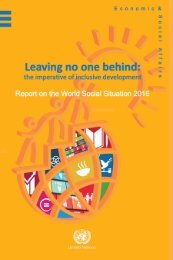Migrant Smuggling Data and Research
zgw9fv2
zgw9fv2
You also want an ePaper? Increase the reach of your titles
YUMPU automatically turns print PDFs into web optimized ePapers that Google loves.
Inadequate attention is currently also paid to how cultural traits impact<br />
on the smuggling process. Existing research indicates that the cultural <strong>and</strong> ethnic<br />
factors play a major role in the strategies adopted <strong>and</strong> that the presence of ethnic<br />
communities in the destination country can act as drivers for irregular migration.<br />
Less however is known about their role in the context of the movement itself.<br />
The smuggling routes from <strong>and</strong> via North Africa to Spain <strong>and</strong> Italy or to Turkey<br />
<strong>and</strong> then Greece have catered for the same population – mainly sub-Saharan<br />
African young men from a wide array of countries of East, West <strong>and</strong> Central<br />
Africa. These routes have only rarely been used by migrants from Asia (such as<br />
Pakistanis or Indians). The routes to North Africa <strong>and</strong> then Italy, Spain or Malta<br />
are occasionally used by families with children, but overall this is rarely the case<br />
(Tri<strong>and</strong>afyllidou <strong>and</strong> Maroukis, 2012). The route from South Asia (Pakistan,<br />
Bangladesh <strong>and</strong> Afghanistan) via the Islamic Republic of Iran, Turkey <strong>and</strong> then<br />
Greece is used by young men from these countries <strong>and</strong> to a large extent by<br />
Afghan families; however, families among Pakistani <strong>and</strong> Bangladeshi are not<br />
encountered (Tri<strong>and</strong>afyllidou <strong>and</strong> Maroukis, 2012). The role of consent <strong>and</strong> trust<br />
are likely to play a major role within this context. Existing data on smugglers<br />
reveal also little about the interconnection between the different nationalities<br />
within the smuggling business itself. In their review of Europol’s activities,<br />
Carrera <strong>and</strong> Guild conclude that “the nationalities of the smugglers is puzzling”;<br />
on the basis of the available data smuggling groups emerge as disparate groups,<br />
with little connection to one another, often with little in common <strong>and</strong> without a<br />
common language. They speculate that it might be that specific nationalities are<br />
linked with specific services (Carrera <strong>and</strong> Guild, 2016).<br />
The recent militarization of the fight against migrant smuggling in Europe,<br />
primarily triggered by the deployment of NATO vessels in the Aegean Sea, is likely<br />
to open new lines of thought <strong>and</strong> cut across a series of disciplines, although it<br />
may not prove much more effective than current approaches (Tri<strong>and</strong>afyllidou,<br />
forthcoming). More than ever, the doctrine on migrant smuggling has come<br />
closer to the discourse on the war on terror. At the same time, growing fears<br />
about the use of the main smuggling paths by Islamic State fighters to enter<br />
Western European countries <strong>and</strong> spread violence has further fuelled on the<br />
debate between securitization <strong>and</strong> human rights. Within this wider context of<br />
fear, insecurity <strong>and</strong> geopolitical turmoil, the recent decision by the European<br />
countries to return to Turkey all irregular migrants <strong>and</strong> potential asylum seekers<br />
crossing into the European Union through the Greek–Turkish borders is likely<br />
to have repercussions of a much wider breadth. In the context of asylum <strong>and</strong><br />
migration, it may generate new flows of people in search of basic human security;<br />
<strong>and</strong> at the same time open up new “business opportunities” for both smuggling<br />
<strong>and</strong> criminal networks (Tri<strong>and</strong>afyllidou, forthcoming). It is also likely, however,<br />
to start a new chapter on human rights (also Baird, 2013b). The danger that<br />
126<br />
5. Europe
















